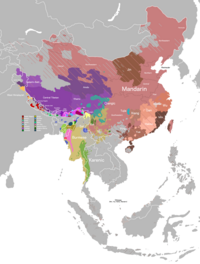Quzhou dialect
You can help expand this article with text translated from the corresponding article in Chinese. (January 2018) Click [show] for important translation instructions.
|
| Quzhou dialect | |
|---|---|
| 衢州話 | |
| Pronunciation | [dʒy tɕiɯ ɦuɑ] |
| Native to | People's Republic of China |
| Region | Quzhou prefecture, Zhejiang |
| Language codes | |
| ISO 639-3 | – |
| Glottolog | chuz1238 |
The Quzhou dialect (衢州話; pronounced Wu Chinese pronunciation: [d̥͡ʒ̊y.tɕiɯ.ɦuɑ][missing tone] in the Quzhou dialect) is a dialect of Wu Chinese spoken in Quzhou, China.
Phonology
[edit]Initials
[edit]| Labial | Dental | Palatal | Postalveolar | Velar | Glottal | ||
|---|---|---|---|---|---|---|---|
| Nasal | m 迷 | n 拿 | ɲ 寧 | ŋ 咬 | |||
| Plosive | tenuis | p 巴 | t 丁 | k 公 | ʔ 愛 | ||
| aspirated | pʰ 怕 | tʰ 聽 | kʰ 空 | ||||
| slack voice | b̥ 爬 | d̥ 停 | ɡ̊ 共 | ||||
| Affricate | tenuis | ts 增 | tɕ 九 | tʃ 真 | |||
| aspirated | tsʰ 寸 | tɕʰ 秋 | tʃʰ 春 | ||||
| slack voice | d̥z̥ 存 | d̥ʑ̊ 求 | d̥ʒ̊ 陳 | ||||
| Fricative | tenuis | f 方 | s 森 | ɕ 心 | ʃ 雙 | x 好 | |
| slack voice | v̥ 房 | z̥ 時 | ʑ̊ 尋 | ʒ̊ 床 | ɣ̊ 或 | ||
| Approximant | l 來 | (j) 移 | (w) 吳 | ɦ 或 | |||
Finals
[edit]| Medial | Nucleus | |||||||||||||||
|---|---|---|---|---|---|---|---|---|---|---|---|---|---|---|---|---|
| ∅ | ɑ | e̞ | ɘɪ | ɔ | ɤ | ə | æ | ən | ã | ɒ̃ | oŋ | əʔ | ənʔ | ɐ̞ʔ | liquid | |
| ∅ | 試 [ʐ] | 家 [ɑ] | 菜 [e̞] | 走 [ɘɪ] | 包 [ɔ] | 勾 [ɤ] | 南 [ə] | 三 [æ] | 本 [ən] | 打 [ã] | 方 [ɒ̃] | 公 [oŋ] | 六 [əʔ] | 脱 [ənʔ] | 白 [ɐ̞ʔ] | 爾 [ɫ] |
| i | 去 [i] | 謝 [iɑ] | 變 [ie] | 表 [iɔ] | 九 [iɯ] | 金 [iɲ] | 兩 [iã] | 旺 [iɒ̃] | 窘 [ioŋ] | 业 [iɘʔ] | 弱 [iɐ̞ʔ] | 姆 [m] | ||||
| u | 布 [u] | 瓜 [uɑ] | 快 [ue̞] | 會 [uɘɪ] | 官 [uə] | 慣 [uæ] | 昏 [uən] | 昌 [uã] | 光 [uɒ̃] | 國 [uəʔ] | 划 [uɐ̞ʔ] | 魚 [ŋ] | ||||
| y | 雨 [y] | 捐 [yə] | 運 [yɲ] | 肉 [yəʔ] | 水衢 [ɥ] | |||||||||||
Tones
[edit]The Quzhou dialect is considered to have seven tones. However, since the tone split from Middle Chinese, characters still depend on the voicing of the initial consonant. These constitute just three phonemic tones: ping, shang, and qu. (Ru syllables are phonemically toneless.)
| Number | Tone name | Tone contour | Examples |
|---|---|---|---|
| 1 | 陰平 yīn píng | [˦] (44) | 江天飛空 |
| 2 | 陽平 yáng píng | [˩˩˨] (112) | 來同魚頭 |
| 3 | 陰上 yīn shàng | [˧˦] (34) | 懂紙古口 |
| 4 | 陽去 yáng qù | [˧˩] (31) | 外地路道 |
| 5 | 陰去 yīn qù | [˥˨] (52) | 對去馬你 |
| 6 | 陰入 yīn rù | [˩˨̚] (12) | 六肉白石 |
| 7 | 陽入 yáng rù | [˥̚] (5) | 各黑出脫 |
Grammar
[edit]Sentence structure
[edit]你
ni
2SG
我
ŋu
1SG
個
kəʔ
GEN
朋友
põ.jɤ
friend
啘。
ue
PTCL
You are my friend
The first example can be compared with Japanese: あなたは私の友達だよ。(anata wa watashi no tomodachi dayo.) Here, 啘 resembles Japanese だよ (dayo).
渠(其)
ɡ̊i
3SG
你
ɲi
2SG
老師
lɔ.sʐ
teacher
啘,
ue,
PTCL,
要
iɔ
have
尊重
t͡seɲ.d̥͡ʒ̊õ
respect
人家。
niŋ.kɒ
other
He/she is your teacher, and you have to respect him/her.
鉛筆
kæ.piəʔ
pencil
借
t͡ʃiɒ
borrow
支
t͡sʐ
CL
我
ŋu
1SG
好伐?
xɔ.fɐ̞ʔ
INTERR
Can I borrow a pencil?
飯
v̥æ
rice/meal
再
t͡se
again
喫
t͡ɕʰiəʔ
eat
碗
uə
bowl
添,
tʰie,
PTCL?
多
tu
more
吃
t͡ɕʰiəʔ
eat
些兒
ʃin
more+
啊。
o
PTCL
If you want to eat more, then eat more if you'd like.
感冒藥
kə.mɔ.jɐ̞ʔ
cold medicine
喫嘞
t͡ɕʰiəʔ.ləʔ
taking/eating
朆
v̥ən
INTERR
你,
ɲi,
2SG,
覅
fiɔ
NEG
記弗着
t͡ɕʰi.fəʔ.t͡ʃɐ̞ʔ
verb-remember/NEG
掉
tɔ
PTCL
唻!
le
IMP
Have you taken your cold medicine yet? Don't forget to take it!
Lexicon
[edit]Pronouns
[edit]- 我 [ŋu˥˨] 1st person singular
- 你 [ɲi˥˨] 2nd person singular
- 渠[ ɡ̊i˩˩˨] 3rd person singular
- 我達 [ŋu˥˨.d̥ɐ̞ʔ˩˨], 我拉 [ŋu˥˨.lɐ̞ʔ˩˨] (我耷) 1st person plural
- 你達 [ɲi˥˨.d̥ɐ̞ʔ˩˨, 你拉 [ɲi˥˨.lɐ̞ʔ˩˨], 爾耷- [n][tAʔ]/[d̥Aʔ], [lAʔ] 2nd person plural
- 渠達 [ɡ̊i˩˩˨.d̥ɐ̞ʔ˩˨], 渠拉 [ɡ̊i˩˩˨lɐ̞ʔ˩˨] (渠耷) 3rd person plural
References
[edit]


